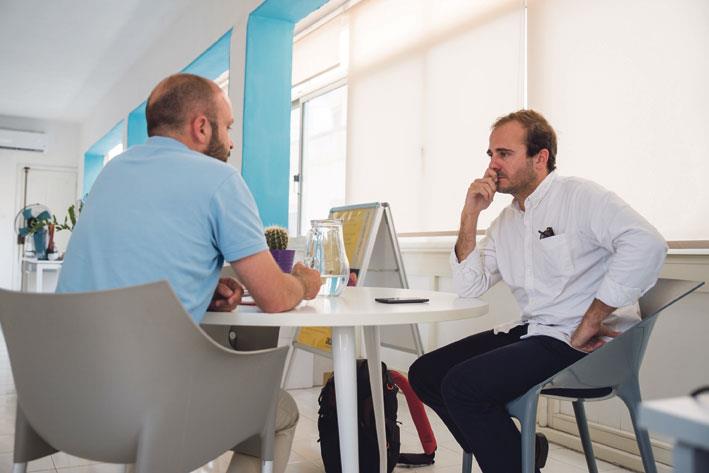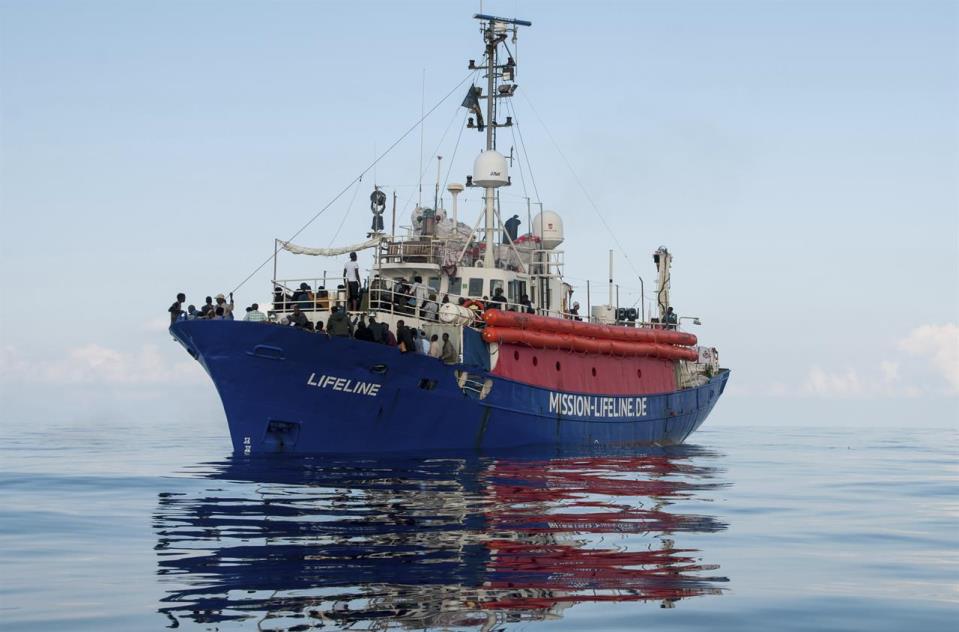Malta and Italy were involved in a second diplomatic standoff after the incident involving the Aquarius, which was only solved with the voluntary intervention of the Spanish government. What is the way forward in such cases?
What we believe should happen, as we have been saying for a number of years, is for Italy and Malta to sit down, discuss and agree on search and rescue (SAR) operational rules. Both countries work under different legal regimes when it comes to search and rescue, and they’re free to do so. However, because of this lack of agreement, which they are both aware of, these incidents will continue to happen, as they have done since 2002.
This is not new. We are aware of the problem, we know what the solution is, but there has been no willingness from the two governments to sit down and try to resolve the situation. Solutions have been proposed such as the introduction of a regional mechanism, but ultimately is the two sides who hold the legal power that need to come to an agreement. It has to be clear what will happen in every scenario, based on where people are rescued, who is in charge of the SAR zone, the number of people on board, and who has the availability to host them. Other EU member states also need to part of the process in offering spaces for disembarked people because this is stumbling block for both Italy and Malta.
However, on an EU level, there seems to be a lot of reluctance towards finding a solution. Will deadlocks such as these push forward this agenda?
The EU has been trying to push responsibility-sharing for years. The strongest result they have had so far was two years ago through the relocation scheme, whereby Malta took some migrants from Italy and Greece. From one perspective, you can say that it was a limited success because on the one hand governments agreed to it and some people were transferred. On the other hand, the quota was not met and governments have been reluctant to follow their commitments. You have states like Hungary and Poland who are giving a clear indication that they will not accept anyone under the relocation scheme. However, the distribution is key to the solution. Countries who are not on the border talk about the need to protect them, but they never speak about the need for support for the people at the borders.

An agreement between Italy and Malta seems far away. Could the country be expecting an increase in boat arrivals this summer?
Yes and no. We are still trying to figure out the details of Italy’s position. What we seem to understand is that Italy will not be accepting any migrants that are rescued by an entity which is not the Italian coast guard, like NGOs or potentially Malta’s AFM, even if legal obligations say they should. We tend to veer more towards the ‘yes’ perspective because Malta needs to be prepared for whatever eventuality. At the moment, Malta is in no way prepared to receive people by boat. We cannot understand why the government last week said that they are prepared, we know from the ground that this is not true.
In what terms is the country unprepared?
If by prepared they mean enough physical space, then yes, the Hal Far and Marsa Centres are massive. However, you do not receive people by simply offering space. You need to have the staff, resources, and procedures to receive them properly. If, for example, on the next boat there are 50 people claiming to be unaccompanied minors. Do we have enough social workers to interview them, assess them, or take care of them? If you have pregnant women, do we have the facilities to cater to them? Does the refugee commissioner have enough workers to receive a sudden increase in casework, without cases being left on the shelf for a number of years? We may have a physical space in terms of a bed, but how well equipped are the open centres to receive so many people in terms of management, administration, and support staff. Can Appogg deal with a new caseload of vulnerable individuals? They can barely cope with the caseload of today, let alone with the possible new arrivals of 100 or 200 cases on a weekly basis.
There’s an argument to be had that the intervention of NGOs in the Mediterranean, while coming from a want to help people, is only further muddying up the waters in an already murky area of diplomacy. Would you agree?
No, diplomatic standoffs used to happen even when NGOs were not out at sea. It’s not fair to say, as the governments are saying, that we have to regulate NGOs. The NGOs are filling a gap which governments are unwilling to perform. People will continue to leave Libya, that is a fact, and no matter how many times we try to go around it, it is the current reality. So we’re either going to ignore that fact and not perform SAR; or engage with it by bringing all the support we can get, including NGOs.
Integration has been a long-standing long-ignored issue. A new action plan has been introduced, has it improved the situation?
It is difficult to assess its impact given that the government is still building up the institutions and the activities within the plan. It is great that there’s a plan. We’ve been asking for years for the government to have a strategy for integration. In the past, we’ve seen individual sporadic efforts by government, but never within a comprehensive and clear vision which brings all stakeholders together. That in itself is already an impact as it fundamentally tells people out there that Malta is in favour of integrating migrants, it is government policy, and it is going to happen. What we want to see next is how it is implemented on the ground and what kind of effort will be made to ensure it is sustainable. We do not this to be a one-off initiative, we need it to become part of mainstream politics.

Yet we have seen anti-foreigner rhetoric become more mainstream, particularly within the Nationalist Party. Shouldn’t this be a concern?
You could call the rhetoric racist. That sentiment has always been part of Malta’s mainstream politics, whether from the government or from the opposition. The discourse on migrants has always been extremely negative. The current environment is worrying. We’ve seen the Opposition become more aggressive in the way it attacks migrants and refugees. We’ve seen it in the Aquarius incident, we’ve seen it in the migrant labour episode. What is more worrying is that they’re using anti-migrant sentiment for political mileage. It is using ugly langue to create social hatred for your neighbours for your own political benefit. That is not politics, it is unacceptable.
From the government’s perspective, we are happy that there is the integration plan. However, what we would like to see, and what would really make a difference, is if the government were to put the same effort and energy into this strategy as they had done for the LGBTIQ movement. I am not saying it happen overnight, but just look at how Malta has changed in terms of the LGBTIQ community in a matter of years. Yes, it is far from perfect, but the openness to discuss certain issues has changed radically. If the same political effort and resources were put towards the integration action plan it would be fantastic, but we are not convinced they are willing to do so.

I think it’s fair to say that the PN’s rhetoric is reflective of a general sentiment amongst the Maltese public. Is there a way to find a balanced solution between the group who advocates for more open borders, and the group of people who are genuinely concerned about migration?
Definitely. It’s good that you speak of both groups because we don’t think it’s useful to try and target far-right groups. They are strong in their beliefs and it is impossible to engage with them. We have tried but the discourse always becomes vulgar and violent. We do understand that people are worried and concerned about migration. Ultimately, people are coming from countries we are not familiar with. They are very different countries. People are coming from war-torn zones. It is a very different reality, so I understand the socio-economic concerns.
What we haven’t managed to do in the last fifteen years is discuss and deal with these fears one by one. All we have done is fuel these concerns through misinformation and painting the migrant refugee as a security, health, and societal threat. We understand people fears but through information and statistics, we can use the opportunity to open people’s eyes to their refugee neighbours. Today, we can see that most Maltese people have met or know a refugee or migrant. This one-to-one relationship is already changing the approach. All we need to do is promote this more, stop talking about it as a phenomenon, and begin recognising it as a human reality.
Last year the police were accused of racial profiling in Marsa. However, the concentration of asylum seekers in that area is creating social problems. Are open centres detrimental to integration?
We had answered that question when the first open centres open and our reaction remains the same. Hopefully, people will understand the lessons learned. It is not a good idea to house 300 people, mostly single men, in the same building, in the same concentrated area, whether they are Nigerian, Norwegian, or Maltese. It is bound to create social problems, more so, when the people you are housing are unwanted by their neighbours, who are vulnerable, who need assistance integrating. Essentially, you are grouping a number of problems and just leaving it to the locality to handle the situation without giving it the resources and support it needs.
We have always pushed for a community-based approach. Rather than go for very large open centres, the country should be able to have a system whereby you have much smaller units spread across the island. Unfortunately, it is tough to say, but the reality is that a majority of Maltese do not like seeing 300 black men at a bus stop. With 300 white foreigners its fine, but you still have social problems. Just look at the areas which house large groups of students, it is a mess.
We understand that the open centres were a response to an emergency, but this is now a reality, it is no longer unpredictable. We can predict the number of people and the percentages according to gender and age, so let’s prepare for it and deal with it in a sustainable way.
And has the government shown interest for a community-based approach?
Never, the government does not want to make it too comfortable with the idea of getting them out and independent. I get it, but the reality is that many people need assistance. You cannot just dump people in a place like that without offering proper assistance and except them to get on with life. We need to keep in mind that these people have experienced war, prosecution, and in some cases rape and torture. You cannot simply expect someone to arrive here and integrate. It does not happen like that. Hopefully, the integration strategy will be successful.
========
A book by the Aditus Foundation, ‘Our Island: Personal accounts of protecting refugees in Malta,’ can be bought against a donation from the NGO’s offices in Marsa.